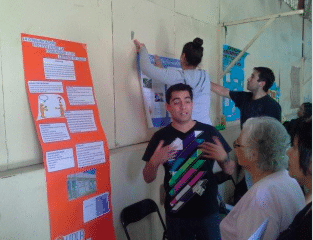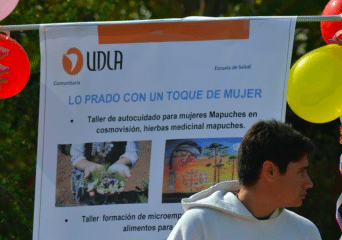Programa de Intervención Comunitaria / Community Intervention Program, Universidad de las Américas (Chile)
 Programa de Intervención Comunitaria / Community Intervention Program (PIC) at Universidad de las Américas serves as a platform that registers, systemizes and disseminates the knowledge produced by students and social leaders in the communities to address social problems of all kinds. The program acts like a space for democratization of knowledge and a space for students to develop their leadership skills, apply their knowledge in the real world and grow as individuals.
Programa de Intervención Comunitaria / Community Intervention Program (PIC) at Universidad de las Américas serves as a platform that registers, systemizes and disseminates the knowledge produced by students and social leaders in the communities to address social problems of all kinds. The program acts like a space for democratization of knowledge and a space for students to develop their leadership skills, apply their knowledge in the real world and grow as individuals.
The program is made up of three key components: pedagogy, territorial (on site), and research. Students from various disciplines participate in the program and generate ideas and projects to be carried out for the next four years of their academic careers. They are provided with technical and moral support from the various faculty, staff and deans involved.
Quick stats:
3,894 students are active participants and come from various disciplines including nutrition, nursing and medicine, kinesiology, occupational therapy, socialwork and psychology.
157 university professionals work in the program
188 of which are researchers;
20 team leaders;
6 coordinators and;
13 are territorial coordinators
Program is active in 29 communities
232 local leaders are active in the program
What is unique about this program?
The students are involved in the program for four years. As the creators of the initiatives and projects implemented, they are able to experience the development of their idea and see it come to life. This timeline allows the student to experience their own personal and professional development all while applying the skills they learned in the classroom. There is also a high human component to this program. This means that the students are able to give proper continuation and follow-up with the various community members they interact with thus developing a sense of trust and community. The students are the heart of the program and initiatives.
“Because we are in many communities with thousands of students carrying out their ideas, it is important to note that in order to do this volume of work well a good structure needs to be in place and that is what we have. The three pillars: pedagogy, community intervention and research provide the necessary mechanisms for there to be evaluations (to and from the students and the community). We also work truly in partnership with the community because we understand that impact can only be achieved when the community is behind it.” – Julian Andres Reyes (staff)